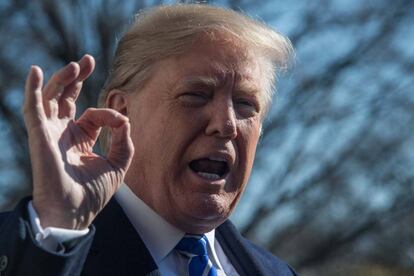While we were not paying attention
Thanks to policy on nuclear weapons and energy independence, the illusion that the US does not need the rest of the world may look more real than ever to lawmakers

At the recent annual meeting of the World Economic Forum in Davos, Switzerland I detected a puzzling mood that I described as “distressed euphoria.” Euphoria over the recovery of the world’s leading economies and the sharp rise in stock prices on Wall Street. And anguish because it was impossible to deny that there are many things that are not going well – everything from climate change and inequality, to the adventures of Trump and Putin, and much more. In Davos there was an awareness that the reasons fueling the euphoria could vanish at any moment.
And so they did. A few days after the meeting, stock prices suffered an unprecedented fall. Naturally, this produced innumerable headlines and comments. But at the same time that the collapse of the stock market attracted the attention of the world, two other things were happening that, while remaining almost invisible to the general public, may end up being more consequential than the recent financial volatility.
Many experts believe the probability of a nuclear war is higher, while others predict a new arms race
The first is that the Trump government announced a new policy on the use of nuclear weapons that includes the possibility of using them in response to a non-nuclear attack. The second is that it was just made public that in November the United States produced more than 10 million barrels of oil a day, a level that it hadn’t reached since 1970.
In the afternoon of February 2, while the majority of Americans were heading for the weekend respite, the Pentagon made public the US Nuclear Posture Review (NPR) for 2018 and beyond. This is a document that every US administration produces to explain the role it envisions for nuclear weapons in the nation’s national security and what kind of weapons systems will be needed to support that posture. The NPR released by the Department of Defense that Friday drastically breaks with the continuity that all US presidents had maintained in this area for almost half a century. The shared goal had been to reduce the role of nuclear weapons as well as their number and variety.
In contrast, the new posture increases the importance of these weapons as well as the nation’s investment in America’s nuclear arsenal. It will also diversify the types of nuclear weapons that can be used. The most radical change is that although the NPR still affirms – as all previous ones have done – that nuclear weapons will only be used in “extreme circumstances,” the 2018 posture broadens the definition of what those extreme circumstances are. Notably, it includes the provision that nuclear weapons could be used against enemies who do not have nuclear weapons themselves. An example would be a nuclear retaliation against those who have carried out a massive cyber attack against the physical infrastructure of the USA – the power grid, telecommunications, the financial system, etc. The NPR also states that the new doctrine requires the creation of new nuclear weapons that would be smaller, more usable, and of lower explosive power. In the language of the experts these would be “tactical” and not “strategic” nuclear weapons. One aspect that is often glossed over is that these “smaller,” “tactical” nuclear weapons can be as devastating as those dropped on Hiroshima (146,000 deaths) and Nagasaki (80,000 deaths).
Both the new nuclear stance and the growing energy autonomy of the US reinforce the isolationism that characterizes Donald Trump’s mindset
The vast majority of experts are alarmed by the adoption of this new nuclear stance. Many believe that the probability of a nuclear war is now higher, while others also anticipate that this will lead to a new arms race. Naturally, the cost of implementing this NPR is immense and will contribute to boosting the already huge fiscal deficit of the United States.
Unfortunately, none of these considerations seem to matter to President Trump and his advisers. They will move forward with the implementation of this new nuclear posture.
Almost at the same time that the new NPR was being released another agency of the US government, the Energy Information Agency (EIA), released its Petroleum Supply Monthly report. This obscure report confirmed that the country is going through an extraordinary energy boom. In November the US produced more than 10 million barrels of crude per day, a volume it had not reached since 1970. Moreover, not only did it break a 40-year-old production record, but also in January it exported its crude to the United Arab Emirates.
The EIA notes that half of those 10 million barrels produced daily last November came from previously inaccessible fields. Now it is possible to extract oil and gas from the shale rocks through the hydraulic fragmentation of these rocks (“fracking”). Only 10 years ago, just 7% of the crude produced in the US came from these formations. Now it is 51%.
Among the many economic and geopolitical consequences of this oil boom one looms large. It also belongs to the same category of the impacts of the newly released NPR.
Both the new nuclear stance and the growing energy autonomy of the US reinforce the isolationism that characterizes Donald Trump’s mindset. With the nuclear trigger lighter than ever and with more energy independence than ever, the mistaken illusion that the US does not need the rest of the world may look more real to the current decision-makers and Trump supporting politicians in Washington.
“America alone” is not just a hypothetical description of this president’s ideas. It’s a slogan that perfectly sums up where Trump is taking the United States.
Tu suscripción se está usando en otro dispositivo
¿Quieres añadir otro usuario a tu suscripción?
Si continúas leyendo en este dispositivo, no se podrá leer en el otro.
FlechaTu suscripción se está usando en otro dispositivo y solo puedes acceder a EL PAÍS desde un dispositivo a la vez.
Si quieres compartir tu cuenta, cambia tu suscripción a la modalidad Premium, así podrás añadir otro usuario. Cada uno accederá con su propia cuenta de email, lo que os permitirá personalizar vuestra experiencia en EL PAÍS.
¿Tienes una suscripción de empresa? Accede aquí para contratar más cuentas.
En el caso de no saber quién está usando tu cuenta, te recomendamos cambiar tu contraseña aquí.
Si decides continuar compartiendo tu cuenta, este mensaje se mostrará en tu dispositivo y en el de la otra persona que está usando tu cuenta de forma indefinida, afectando a tu experiencia de lectura. Puedes consultar aquí los términos y condiciones de la suscripción digital.









































